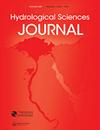Optimal reservoir operation using the improved multi-step-ahead time-varying hedging rule under climate and land-use changes
IF 2.5
3区 环境科学与生态学
Q2 WATER RESOURCES
Hydrological Sciences Journal-Journal Des Sciences Hydrologiques
Pub Date : 2023-04-04
DOI:10.1080/02626667.2023.2196427
引用次数: 1
Abstract
ABSTRACT This study aims to optimize Yeywa Hydropower Reservoir (YHR) operation using the multi-step-ahead time-varying hedging (TVH) rule under climate change (CC) and land-use change (LUC) to improve summer power generation. The performance of three multi-objective algorithms – the Multi-objective Salp Swarm Algorithm (MOSSA), the Multi-objective Antlion Optimizer (MOALO) and the Non-dominated Sorting Whale Optimization Algorithm (NSOWA) – are compared. MOSSA provides the best solutions with a higher mean hypervolume in a shorter computation time, and it is utilized to optimize the TVH rules for four periods: monthly (TVH-1), quarterly (TVH-3), half-yearly (TVH-6) and yearly (TVH-12). The six-month-ahead TVH-6 rule and the five-month-ahead TVH-6 rule generate the highest summer power for the historical period (2011–2020) and the future period (2020–2059), respectively. The future decadal power generation is expected to be higher than the historical power generation. The future TVH-6 rule is more reliable and it has lower water deficits than the historical YHR operation rule.气候和土地利用变化下基于改进多步超前时变对冲规则的水库优化调度
摘要本研究旨在利用气候变化(CC)和土地利用变化(LUC)下的多步超前时变对冲(TVH)规则对野洼水电站(YHR)运行进行优化,以提高夏季发电量。比较了多目标Salp Swarm算法(MOSSA)、多目标Antlion优化器(MOALO)和非支配排序鲸优化算法(NSOWA)三种多目标算法的性能。MOSSA在较短的计算时间内提供了较高的平均超容量的最佳解决方案,并用于优化四个周期的TVH规则:每月(TVH-1),季度(TVH-3),半年(TVH-6)和每年(TVH-12)。历史时段(2011-2020年)和未来时段(2020-2059年),提前6个月的TVH-6规则和提前5个月的TVH-6规则夏季发电量最高。未来十年发电量预计将高于历史发电量。未来的TVH-6规则比历史的YHR运行规则更可靠,亏水更低。
本文章由计算机程序翻译,如有差异,请以英文原文为准。
求助全文
约1分钟内获得全文
求助全文
来源期刊
CiteScore
6.60
自引率
11.40%
发文量
144
审稿时长
9.8 months
期刊介绍:
Hydrological Sciences Journal is an international journal focused on hydrology and the relationship of water to atmospheric processes and climate.
Hydrological Sciences Journal is the official journal of the International Association of Hydrological Sciences (IAHS).
Hydrological Sciences Journal aims to provide a forum for original papers and for the exchange of information and views on significant developments in hydrology worldwide on subjects including:
Hydrological cycle and processes
Surface water
Groundwater
Water resource systems and management
Geographical factors
Earth and atmospheric processes
Hydrological extremes and their impact
Hydrological Sciences Journal offers a variety of formats for paper submission, including original articles, scientific notes, discussions, and rapid communications.

 求助内容:
求助内容: 应助结果提醒方式:
应助结果提醒方式:


